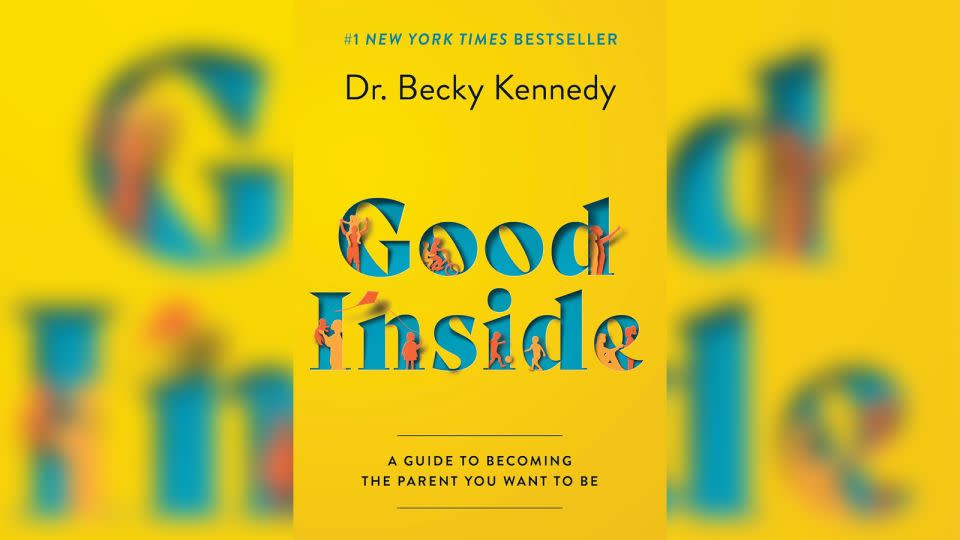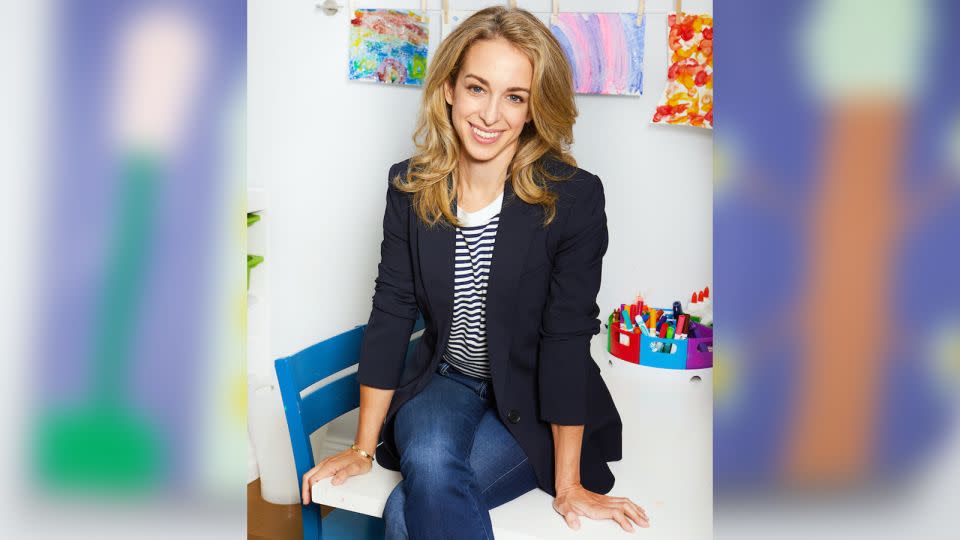Lost your cool with your kid? Here’s what to do next
Editor’s note: Shift Your Mindset is a new series from CNN’s Mindfulness, But Better team. We talk to experts about how to do things differently to live a better life.
Ever lost your cool with your kid? Really, who hasn’t? Fortunately, there are steps we can take to mend ties with our children — or anyone, for that matter — and heal relationship disruptions after tempers flare.
“Parenting whisperer,” clinical psychologist and author of the bestseller “Good Inside: A Guide to Becoming the Parent You Want To Be,” Dr. Becky Kennedy says it’s never too late to heal rifts with our kids. In her powerful new TED Talk, Kennedy walks listeners through what she calls the single most important parenting strategy: repair.
By “prioritizing connection over consequences,” Kennedy encourages parents to rewrite the ending of a not-so-great parenting moment, rewiring our children’s brains in the process. Making steps toward repair with our kids is important because it models taking responsibility for our actions and reactions while promoting resilience and a clear sense of self.
This conversation has been edited and condensed for clarity.

CNN: What does it mean for a parent or guardian to repair after yelling at their child?
Dr. Becky Kennedy: At its core, repair is about reconnecting with a kid after disconnection. By bringing our safe, compassionate self to our children following a moment when we lost our temper, we change how that memory gets stored in their bodies. Layering on support after criticism, softness after yelling and understanding after misunderstanding helps transform any messages our kids have internalized that they’re alone or bad inside.
Start by saying you’re sorry. Next, reflect back what happened so they know it wasn’t all in their heads. Then say what you wish you’d done instead and how you plan to handle things differently in the future.
CNN: You explain that repair changes the wiring in a child’s brain. How can a conversation we have with our child after the fact alter an existing memory?
Kennedy: Memory isn’t simply a system of recalling events; it’s more like a game of telephone. Every time you remember an event from your past, your brain networks change in ways that modify the recollection of that event. This is why therapy is helpful. Recalling distressing experiences when we felt overwhelmed and alone within the context of a safer, more connected relationship helps us put meaning to it and start to connect the dots. The therapeutic relationship changes the memory so it’s no longer so overwhelming. The event doesn’t change but the way it lives in your body does.

This phenomenon sits at the core of repair. When I yell at my kid, or say words I wish I hadn’t, they likely feel scared, overwhelmed and alone. If I’m able to explain afterward why this thing happened and how it wasn’t really my kid’s fault, the connection, love, safety and compassion they feel from me will get stored in my child’s body next to the distressing event. Because of my repair, their memory of the event won’t be as overstimulating or driven by self-blame.
CNN: You write that repair can happen 10 minutes, 10 days or 10 years after a blowup. Why is it never too late for repair?
Kennedy: I’ve had people say to me things like, “I feel like I basically yelled at my kid for 11 straight years. I don’t think I ever really got to know him, and my kid is now 20.” So often parents sink into guilt and self-blame after not-so-great moments. That kind of thinking just takes away our agency. Instead, we can stop the “I’m an awful parent” spiral by taking action to make the situation better.
I want parents to know that sometimes the smallest step in the direction of repair can have a profound impact on our children and our relationships. At the end of my TED Talk, I walk everyone in the audience through an imagined repair from their parents that really drives this point home. People tell me they get teary even just imagining their parent acknowledging something about some painful experiences in their collective past. That impact demonstrates it’s never too late to have a powerful repair with our children.
We can be cynical: “Sure, like that moment is going to change everything.” No, it will not change everything. It will change some things, and changing some things is a direction toward change, and is even the direction toward changing lots of things. I like to start with small moments that have big impact and get us walking down a new path. I promise you, there are things you can do today to improve your relationship with your child.
CNN: Does a parent’s regret need to be verbalized to bring about repair? What if the blow-up is followed by a snuggle on the couch or some other form of reconnection?
Kennedy: Maya Angelou said, “people won’t remember what you said or did, they will remember how you made them feel.” Instilling a sense of a repair helps kids go from feeling alone, overwhelmed and confused to safer, more grounded and more connected. Showing up to your kid with a snuggle after a rupture is a beautiful action. I would never tell a parent don’t do that, or that’s not enough.
But the difference is, the feelings involved in the rupture moment still remain. Humans love stories. They’re in our nature. The only way we make meaning out of feelings is through stories. And in the absence of giving our kids a story to help them understand the rift, they’ll probably make up their own. Kids tend to default into self-doubt, which can look like “I always misunderstand things around me,” or self-blame, which can leave kids thinking their parent yelled because they’re unlovable.
Instead, I urge parents to recognize the power they have to rewrite the stories our kids tell themselves by explaining: “Hey, I was having a hard time. I’m sorry I yelled. I wish I’d stepped aside to better manage my own feelings.”
CNN: How do you respond to parents who worry this approach won’t teach children that actions have consequences?
Kennedy: Instead of spending so much time on an action’s consequences, I recommend we focus in on what precedes an action we deem “bad behavior.” These behaviors have antecedents. If we can figure out what’s going on for a kid before the action, we have a much greater likelihood of changing it.
Some people would say, “Well, your kid’s going to face the consequences in the real world.” My reply is, “No, my kid is not going to do that behavior in the real world, because they’ve learned the skills they need to change their behavior.” I don’t think kids decide to have bad behavior, like smacking their brother or saying “I hate you” to their mom. They’re overwhelmed by an emotion that explodes into behavior.
Here’s an example I hear all the time: “I ask my kid a million times, calmly, to put on their shoes. When they don’t get on their shoes, I yell at them. What’s my kids’ role in that equation?”
Examining what’s getting in the way of the kid listening is a more effective place to intervene. From that place I might say to my kid, after repair, “Hey, mornings are a disaster. It doesn’t feel good to ask you to do something a million times. I apologize for yelling yesterday. Even when I’m frustrated, it’s not okay to scream at you. I think we’d both like mornings to feel better. Let’s think … I wonder what would have to change to make putting on your shoes a little bit easier? I bet you have an idea too.”
If you believe in your child as someone who wants to work with you, who is capable of solving problems, they will start to show you that goodness and become that kid.
CNN: What is the difference between repair and apology?
Kennedy: An apology can be used to shut down conversation: “I’m sorry I yelled. Can we move on?” A good repair opens up conversation. The most important focus of repair is the impact it has on the other person. When we repair with someone, we strengthen our relationship with them. At the end, it makes people feel like they’ve learned something new, have a better understanding and feel closer to the person. We can judge the difference by the feeling.
READ MORE: Sign up for CNN’s Stress, But Less newsletter. Our six-part mindfulness guide will inform and inspire you to reduce stress while learning how to harness it.
CNN: Parenting often happens in pairs. What happens if one parent is working to repair while the other is not. Can one parent repair on behalf of the other?
Kennedy: We can repair on behalf of someone else. And we can do that without throwing the other person under the bus. Whenever I’m stuck for words, I say to myself, “Becky, just name what’s true.” I might say to my kid, “Hey, I heard Grandma (or) Dad yell at you earlier, and I’m sure that felt scary. It’s never OK for someone to scream at you.” Next, I would probably say, “Apologizing is really hard for your dad. And I think it’s because he feels so bad that he has trouble naming it and coming to you.” With this approach, nobody’s the bad guy. And my kid has a new understanding of the circumstances without interpreting the situation as their fault. Simply saying what’s true can bring relief for the whole family system.
Jessica DuLong is a Brooklyn, New York-based journalist, book collaborator, writing coach and the author of “Saved at the Seawall: Stories From the September 11 Boat Lift” and “My River Chronicles: Rediscovering the Work That Built America.”
For more CNN news and newsletters create an account at CNN.com

